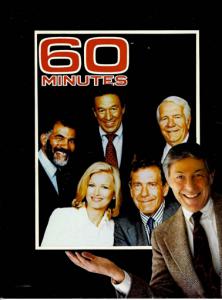MULTI-PLATINUM PRODUCER JOEL DIAMOND RECALLS MOMENTS WITH '60 MINUTES' CREATOR DON HEWITT
REFLECTIONS WHEN MUSIC MET MEDIA IN THE ELEVATORS OF 220 CENTRAL PARK SOUTH
LOS ANGELES, CA, UNITED STATES, July 3, 2025 /EINPresswire.com/ -- "The current crisis engulfing 60 Minutes would have been unthinkable under Don Hewitt’s stewardship” says neighbor Joel Diamond. The $20 billion lawsuit, the departures of Executive Producer Bill Owens and Wendy McMahon, and the public accusations of editorial compromise all represent precisely the kind of institutional decay Hewitt spent his career guarding against.“Because we are in America, we are blessed with the right to report fully and freely,” Hewitt once declared. “The best way to ensure that we go on having the freedom to publish and broadcast is to guard against self-indulgence.” His insistence that no one should be able to “label 60 Minutes stories as left, right, or center” wasn’t mere idealism but strategic wisdom about building lasting influence.
When Owens announced he could no longer “make independent decisions based on what was right for 60 Minutes,” he was describing exactly the kind of institutional pressure Hewitt understood would be fatal to the program’s credibility. McMahon’s subsequent departure, citing fundamental disagreements about the program’s direction, only deepened the sense that something essential was being lost.
The contrast between Hewitt’s quiet authority and today’s corporate theatrics reveals something crucial about sustainable leadership. True power, it seems, doesn’t announce itself through boardroom ultimatums or public relations campaigns. It accumulates through consistent decisions, authentic relationships, and unwavering commitment to core principles.
The elevators at 220 Central Park South had witnessed more than their share of power conversations. But perhaps none were as quietly profound as the daily encounters between a multi-platinum record producer and the man who would prove to be one of television’s most influential figures.
For months, Joel Diamond shared these vertical journeys with a neighbor he knew simply as “Don”, a gentleman whose understated demeanor gave no hint of the media empire he’d built. Their polite exchanges were unremarkable until curiosity finally prompted Diamond to ask the inevitable question about his companion’s work.
“I’m the creator and executive producer of 60 Minutes,” came the matter-of-fact reply that would reframe everything Diamond thought he knew about power and presence.
This moment perfectly captured Don Hewitt’s extraordinary relationship with success. Here was the architect of television’s most respected news program, treating his revolutionary achievement as casually as one might discuss the weather. It’s a quality that feels almost revolutionary in today’s landscape of carefully curated personal brands and corporate grandstanding. The creator of 60 Minutes grasped something essential about power—an understanding that today’s media executives appear to have lost.
At the prestigious 220 Central Park South, where Joel Diamond had made the penthouse his home for over two decades, elevator conversations had often been as revealing—and as valuable—as his sweeping views of Central Park itself. Today, that same residence holds the distinction of being America’s most expensive residential sale in history, purchased by hedge fund billionaire Ken Griffin for 248 Million and even eclipsing the price of Beyonce & Jay Z’s new Malibu estate.
Diamond’s memories of his former neighbor offer something precious - an intimate portrait of authentic leadership in action. Whether Hewitt was enthusiastically unrolling what Diamond diplomatically describes as “rather unattractive” carpet samples across their shared lobby, or inscribing a book with characteristic self-deprecation (“Joel, if your neighbor likes your book, how bad can it be?”), his approach to influence was refreshingly human.
Don Hewitt didn’t build 60 Minutes through grand gestures or corporate maneuvering. He built it through daily commitment to editorial excellence, one story at a time, one decision at a time.
As Joel Diamond reflects on his extraordinary journey—from chance elevator encounters that led to industry-shaping breakthroughs, to a celebrated music career and his enjoyable single life in Calabasas—his story remains unmistakably his own. One thing he’s equally sure of: Don Hewitt would never have resigned or yielded under today’s mounting pressures. In an era increasingly marked by retreat and compromise, that brand of steady, quiet resolve feels like exactly the kind of leadership we need in 2025.
Joel Diamond
818-980-9588
jdiamond20@aol.com
www.joeldiamond.com
Joel Diamond
Silver Blue Productions, Ltd.
+1 818-980-9588
email us here
Legal Disclaimer:
EIN Presswire provides this news content "as is" without warranty of any kind. We do not accept any responsibility or liability for the accuracy, content, images, videos, licenses, completeness, legality, or reliability of the information contained in this article. If you have any complaints or copyright issues related to this article, kindly contact the author above.
The title logo for THE GHOST IN THE SHELL, designed by Hajime Sorayama, has been revealed | 2026 anime by Science SARU
PD16 Legacy Builders Celebration Honors Nine Men of Impact for Transformational Community Leadership
EBC Санхүүгийн Групп “Шилдэг CFD Үйлчилгээ Үзүүлэгч” шагнал хүртлээ
Więcej ważnych informacji
 Jedynka Newserii
Jedynka Newserii

 Jedynka Newserii
Jedynka Newserii

Bankowość

Rośnie liczba i wartość udzielonych konsumentom kredytów gotówkowych. Gorzej mają się kredyty ratalne oraz te udzielane firmom
Rynek kredytowy w Polsce co do zasady rośnie, choć nierównomiernie. Z danych Biura Informacji Kredytowej wynika, że najlepiej rozwija się segment kredytów gotówkowych dla konsumentów. Wartościowo wzrosła też kwota udzielonych limitów w kartach kredytowych. Według prognoz BIK w całym roku wzrośnie wartość zarówno udzielonych kredytów mieszkaniowych, jak i gotówkowych, choć tych pierwszych poniżej inflacji. Wcześniejsze cięcia stóp procentowych przez RPP nie zmieniły tej prognozy.
Transport
37,5 proc. środków z Planu Społeczno-Klimatycznego trafi na walkę z ubóstwem transportowym. Organizacje branżowe apelują o zmianę priorytetowych projektów [DEPESZA]

Ministerstwo Funduszy i Polityki Regionalnej z końcem czerwca zakończyło konsultacje Planu Społeczno-Klimatycznego, który otwiera drogę do pozyskania 65 mld zł (11,4 mld euro) z unijnego Społecznego Funduszu Klimatycznego. Polska będzie jego największym beneficjentem, a 37,5 proc. budżetu zostanie przeznaczone na bezpośrednie wsparcie osób narażonych na ubóstwo transportowe. Organizacje branżowe oceniają jednak, że walka z tym zjawiskiem może się okazać nieskuteczna. W toku konsultacji zgłosiły swoje zastrzeżenia co do priorytetów w wydatkach i sposobu wsparcia inwestycji w transport rowerowy.
Prawo
Firmy będą mogły przetestować krótszy tydzień pracy z rządowym wsparciem. Nabór wniosków ruszy w sierpniu

Ministerstwo Rodziny, Pracy i Polityki Społecznej uruchamia pilotaż krótszego tygodnia pracy. Zainteresowane wzięciem w nim udziału firmy będą się mogły ubiegać o wsparcie finansowe ze strony rządu. Politycy Nowej Lewicy, którzy są pomysłodawcami testu tego rozwiązania, przekonują, że finalnie zyskają na nim wszyscy, zarówno pracownicy, jak i pracodawcy, a ostrzeżenia o spodziewanych problemach gospodarki są mocno przesadzone.
Partner serwisu
Szkolenia

Akademia Newserii
Akademia Newserii to projekt, w ramach którego najlepsi polscy dziennikarze biznesowi, giełdowi oraz lifestylowi, a także szkoleniowcy z wieloletnim doświadczeniem dzielą się swoją wiedzą nt. pracy z mediami.

![37,5 proc. środków z Planu Społeczno-Klimatycznego trafi na walkę z ubóstwem transportowym. Organizacje branżowe apelują o zmianę priorytetowych projektów [DEPESZA]](https://www.newseria.pl/files/1097841585/rower3,w_85,_small.jpg)







.gif)

 |
| |
| |
|